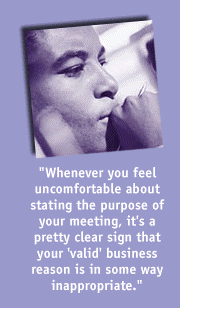
It's All About Mutual Respect and Satisfaction.
| Продажи | ||||
| Sales.com | ||||
| Preparing... | ||||
by Stephen E. Heiman, Diane Sanchez with Tad Tuleja
At Miller Heiman, we strongly feel that there should be a specific purpose to every sales meeting. We call that purpose a Valid Business Reason. Mark Sellers provides an excellent description of the concept in a Sales.com article titled Rules of Engagement for Initial Sales Calls (in the Preparing for the Call category). In brief, a Valid Business Reason is something that gives a potential buyer a reason for wanting to spend his or her valuable time meeting with you. We don't mean your reason; we mean your customer's or potential customer's reason for seeing you. Virtually all of the people we work with see the value of presenting a Valid Business Reason on every call. But we do encounter occasional resistance, usually from people who were taught that "friendship" or "keeping in touch" can be an adequate reason to call on a client. Here's how we counter their objections:

Reservation 1: It can't be necessary on every call. "There are still some calls where socializing is the only agenda, and where I don't really need a valid reason for meeting because I'm not doing business; I'm just keeping the fires warm."
Sure, there are scenarios like this. There are plenty of social situations where you just want to wine and dine a potential customer for the simple reason that you enjoy his or her company. But you should not confuse these situations with sales calls. In a sales call, you are asking someone to give you professional time so you can explore ways of advancing each other's business goals. When you're in this professional mode, no matter how close you are personally, you owe the person (and yourself) quality time. The only way you can be sure of giving the quality time is to have a Valid Business Reason defined when you meet. Every time.
Reservation 2: I don't want to come across as hard-nosed. "I don't want to be so rigid in insisting on the business side of the relationship that she thinks I don't care about her as a person. Miller Heiman says I should seek ways to let all of my clients win, personally. How can I do that if I never talk about anything but business?"
This objection also confuses the personal and professional aspects of a business relationship. If you're relaxing at the pool or on the golf course with good old Joe, fine, relax. But a sales call is a very special situation, with its own exacting requirements. Obviously, even in this exacting environment you should avoid precipitous bluntness, as in statements like "Let's not waste each other's time" or, "Hi, Joe, the purpose of this meeting is . . ." But this is a matter of style, and of maintaining sensitivity to your individual customers. The pleasantries that open many sales calls are perfectly acceptable as icebreakers. But don't kid yourself: They are not part of the sales call proper. When the two of you get down to business, that's exactly what you have to do: focus on your mutual business needs.
Far from being "inconsiderate" or "hard-nosed," defining a Valid Business Reason on every call is actually a very considerate way of doing business. It indicates to the potential buyer - whether you've known her twenty years or ten minutes - that you've given some thought to her current position and that you're seeking ways to improve it. It shows, too, that you are open to revising your understanding - that you're comfortable having a meeting only if it's "valid" for her.
Reservation 3: I feel uncomfortable stating the reason out loud. "It seems too obvious, too direct, to blurt out, 'We're meeting today for the following reason.' It seems almost insulting, as if the person can't figure that out for himself. I prefer to feel my way into the situation, rather than being so blunt."
Whenever you feel uncomfortable about stating the purpose of your meeting, it's a pretty clear sign that your "valid" reason is in some way inappropriate. Perhaps you've phrased it (to yourself or to the buyer) incorrectly; or perhaps you don't really understand, yourself, why the two of you are getting together. If the Valid Business Reason is correctly stated, it will never be "insulting" to the client - and it should never make you want to "feel your way." If you have some anxiety about saying out loud why you're there, reexamine what you feel to be the purpose of the meeting. You may find it helpful; in doing this, to rephrase the Valid Business Reason in the form of a question: "Am I correct in understanding that the purpose of this meeting is to . . . ?"
It all comes back to mutual satisfaction and mutual respect. Clarifying a meeting's purpose with a Valid Business Reason is a straightforward and necessary technique for enhancing clarity and good information flow.
Adapted from The New Conceptual Selling Stephen E. Heiman, Diane Sanchez with Tad Tuleja (c) 1999 by Miller Heiman, Inc., All rights reserved with permission of Warner Books.